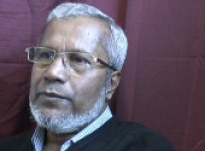Haq

Following his father's death from prostate cancer in 2000 Haq had a series of PSA tests followed by a biopsy confirming prostate cancer. He had a prostatectomy in 2005, radiotherapy in 2006 and hormone therapy in 2009. He is currently taking Bicalutamide (tablet), also known as Casodex.
Haq is a retired manufacturing business owner who is married with three adult children. Ethnic background is Bangladeshi.
More about me...
Haq’s father died from prostate cancer in May 2000 in Bangladesh after being diagnosed late. This alerted Haq to the possibility that he also may be at risk from prostate cancer so on his return to England he spoke to his GP who referred him to hospital where a PSA test was done. He took part in a research project which involved measuring his PSA and digital rectal examinations every few weeks for six months. When his PSA rose to 7.5 he was sent for a biopsy which indicated he had early stage prostate cancer. The consultant explained the two treatment options of surgery or radiotherapy. Haq chose surgery as it was explained to him that if he had surgery and it was unsuccessful then he could still have radiotherapy but if he chose radiotherapy first and it was unsuccessful then he could not have surgery.
Haq had his prostate removed in May 2005 but six months later his PSA was beginning to rise again and in 2006 he had 30 radiotherapy sessions. While he had little incontinence after his surgery he had difficulty in controlling his ‘waterworks’ after the radiotherapy and while this eased at times he was always conscious of it. He continued having regular PSA checks and his PSA level began to rise again and after bone and bladder scans he was told he still had prostate cancer. In November 2009 he began three-monthly injections of Zoladex hormone treatment. He has had continuing problems with urinating and was prescribed a self-catheter which he still uses once a week. In October 2010 he had another biopsy and was told that he still has prostate cancer and the only option for him was Cryotherapy. He is not keen on Cryotherapy because of the low success rate and the side effects. He is also unhappy with the Zoladex as he experiences hot flushes and other side effects. He feels that he is one of the unlucky ones in his experience of prostate cancer and is uncertain how to proceed with treatment. He now copes with the incontinency and takes it for granted that it is something he will have to continue to cope with. At the back of his mind he knows that he is living with cancer and it worries him that it might someday spread.
Interview conducted in 2011 by Anne Montgomery.


